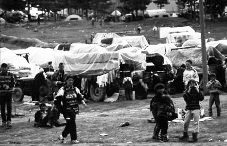 | A makeshift refugee camp |
Two thousand people in two thousand five hundred square metres. A sort of farmyard, enclosed by a cement wall, houses one of the
Dozens of others are housed in a stable, transformed into a hospice. Entering one of those rooms is an unforgettable and disturbing experience. The powerful stench, the wide gaze of old people and children, the sick, and the others who crowd around you, wanting to know or get something, at least a little human comfort. Don Antonio tries to keep this camp going as best he can, with the limited means at disposal. There's a first aid tent, but the thick, pitiless mud gets in everywhere. There are no sanitary facilities, and not even running water. The priest asked us to come and help reorganise the camp a little, to give advice about drainage, and how to organise things so that the excrement scattered all around did not give rise to epidemics. I went round the lazaretto with another couple of volunteers, looking for suitable places for the latrines, and pointing out where to put the clothes-lines to hang out the washing in the sun, or how to make the water run off away from the sleeping-areas. The men listened to me attentively. But after three days everything was back to the way it had been before. | |||
| | |||
|
| |||
| |
